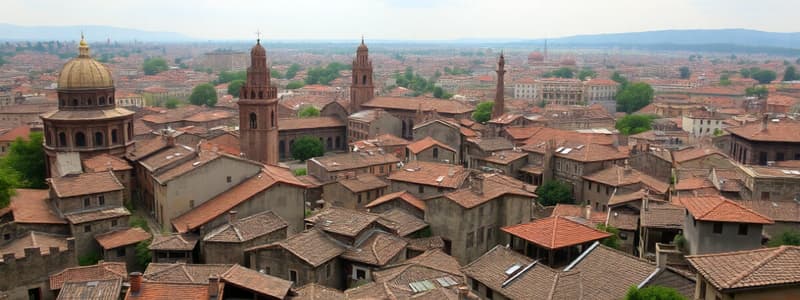Podcast
Questions and Answers
Which factor can destabilize a civilization?
Which factor can destabilize a civilization?
- Religious stability
- Loss of social cohesion (correct)
- Increased social cohesion
- Consistent cultural values
Which ancient civilization was known for its monumental architecture and intricate writing systems?
Which ancient civilization was known for its monumental architecture and intricate writing systems?
- Ancient Greece
- Ancient Egypt (correct)
- Ancient Mesopotamia
- Ancient Indus Valley
What activity facilitates interaction between civilizations?
What activity facilitates interaction between civilizations?
- Segregation
- Isolation
- Stagnation
- Warfare (correct)
What was a major contribution of Ancient Greece?
What was a major contribution of Ancient Greece?
What is a characteristic of civilizations?
What is a characteristic of civilizations?
Which of the following is a common feature of civilizations?
Which of the following is a common feature of civilizations?
What does agriculture enable in the context of civilization?
What does agriculture enable in the context of civilization?
Which factor can lead to the decline of a civilization?
Which factor can lead to the decline of a civilization?
What is a consequence of political instability within a civilization?
What is a consequence of political instability within a civilization?
Which of the following is a characteristic of social stratification in civilizations?
Which of the following is a characteristic of social stratification in civilizations?
What do civilizations produce as part of their cultural development?
What do civilizations produce as part of their cultural development?
How does technological stagnation impact civilizations?
How does technological stagnation impact civilizations?
What role do cities play in civilizations?
What role do cities play in civilizations?
Flashcards
Civilization
Civilization
A complex human social arrangement with social structures, political organizations, and cultural production.
Key Characteristics of Civilizations
Key Characteristics of Civilizations
Features such as urbanization, agriculture, social stratification, political organization, and cultural development.
Urbanization
Urbanization
The growth of cities acting as hubs for trade, administration, and culture.
Agriculture
Agriculture
Signup and view all the flashcards
Social Stratification
Social Stratification
Signup and view all the flashcards
Political Organization
Political Organization
Signup and view all the flashcards
Factors Influencing Civilizations
Factors Influencing Civilizations
Signup and view all the flashcards
Environmental Change
Environmental Change
Signup and view all the flashcards
Social and Ideological Factors
Social and Ideological Factors
Signup and view all the flashcards
Civilizational Interactions
Civilizational Interactions
Signup and view all the flashcards
Ancient Mesopotamia
Ancient Mesopotamia
Signup and view all the flashcards
Silk Road
Silk Road
Signup and view all the flashcards
Diversity of Civilizations
Diversity of Civilizations
Signup and view all the flashcards
Study Notes
Defining Civilization
- Civilization is a complex human social arrangement featuring developed social structures, political organizations, and cultural production. It often includes agriculture, urban centers, specialized labor, and writing systems.
- Criteria for civilizations vary, but common features include:
- Large-scale agriculture
- Urban centers
- Specialized labor (artisans, priests, warriors)
- Monumental architecture
- Writing systems (like hieroglyphics and cuneiform)
- Sophisticated political organizations (states and empires)
- Civilizations develop through a complex process influenced by:
- Environmental conditions
- Technological advancements
- Social interactions
- Political structures
Key Characteristics of Civilizations
- Urbanization: Cities and urban centers are hubs for trade, administration, and cultural exchange.
- Agriculture: Surplus food production supports larger populations and specialized labor in civilizations.
- Social Stratification: Complex social hierarchies and distinct social classes define civilizations.
- Political Organization: Specialized political institutions and leaders manage societal complexity and resource allocation.
- Cultural Development: Civilizations produce advanced art, architecture, religion, and knowledge systems, reflecting their values.
Factors Influencing the Rise and Fall of Civilizations
- Environmental Change: Droughts, floods, and disasters impact agricultural production, potentially causing societal collapse.
- Political Instability: Wars, internal conflicts, and power struggles contribute to decline.
- Economic Factors: Resource depletion, trade disruption, and inequality weaken civilizations.
- Technological Stagnation: Lack of innovation hinders adaptation and contributes to decline.
- External Pressures: Invasions, conquests, and interactions with other civilizations significantly impact civilizations.
- Disease: Epidemics and pandemics dramatically reduce populations and disrupt societies.
- Social and Ideological Factors: Loss of social unity, religious upheaval, and shifts in values destabilize civilizations.
Examples of Civilizations
- Ancient Mesopotamia: Early urban centers and agricultural practices emerged here.
- Ancient Egypt: Famous for monumental architecture, writing systems, and a well-organized political structure.
- Ancient Indus Valley: Advanced urban planning and sophisticated infrastructure defined this civilization.
- Ancient China: Complex political systems, philosophy, and technology developed.
- Ancient Greece: Contributions to philosophy, democracy, and art influenced later civilizations.
Civilizational Interactions
- Civilizations interact through trade, warfare, migration, and cultural exchange.
- The exchange of ideas, technologies, and goods influences societal development throughout history, as seen on the Silk Road, for example.
- Conflicts and warfare can impact the rise or fall of civilizations.
Diversity of Civilizations
- Civilizations exhibit geographical, social, political, and cultural diversity.
- Understanding these variations highlights the breadth of human experience.
- These differences showcase diverse historical trajectories and outcomes.
Studying That Suits You
Use AI to generate personalized quizzes and flashcards to suit your learning preferences.
Description
Explore the concept of civilization, its defining characteristics such as urbanization, agriculture, and specialized labor. Understand the factors that influence civilization development, including environmental conditions and technological advancements. Learn about social interactions and political structures that shape civilizations.




